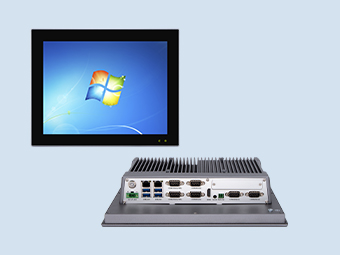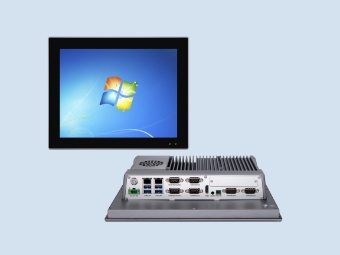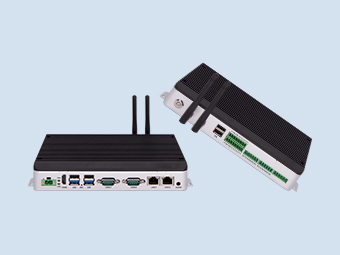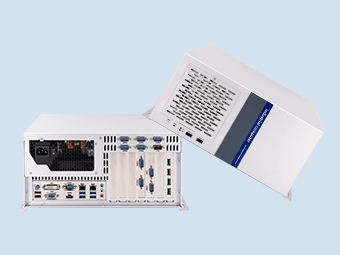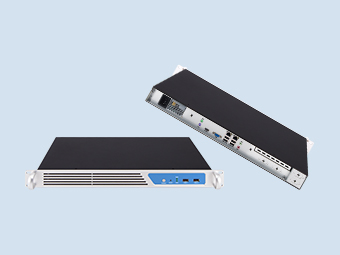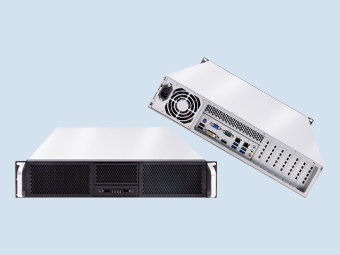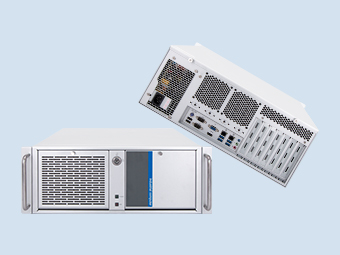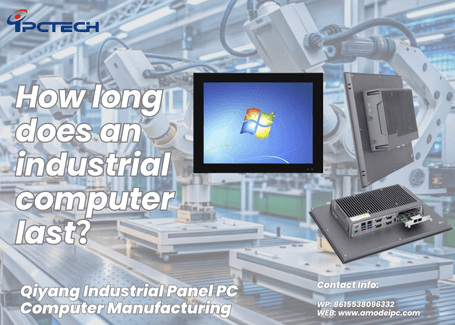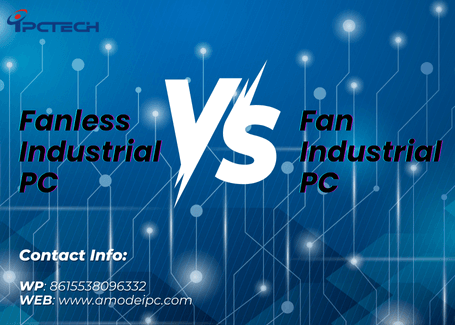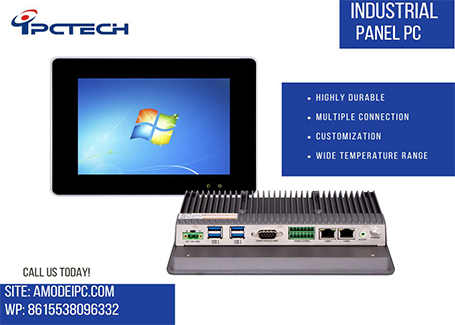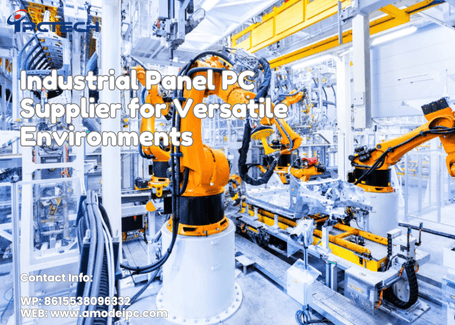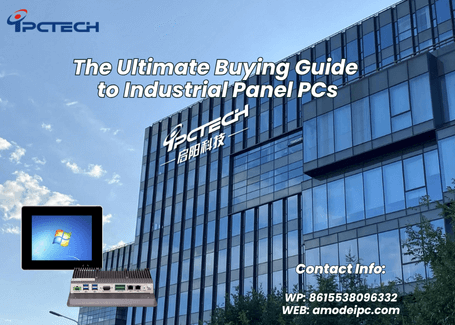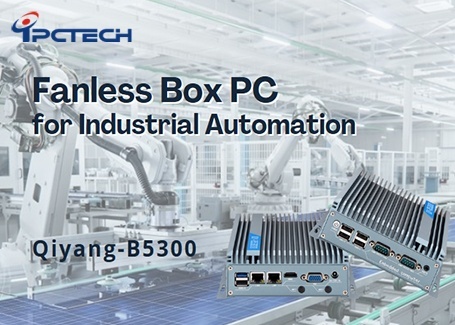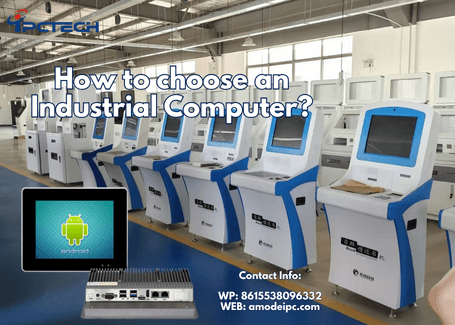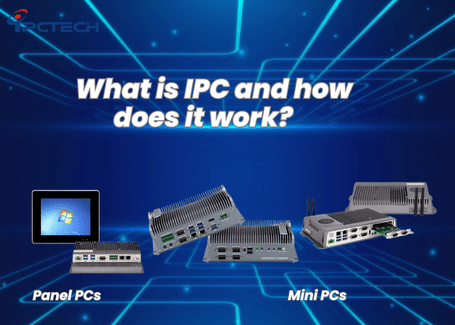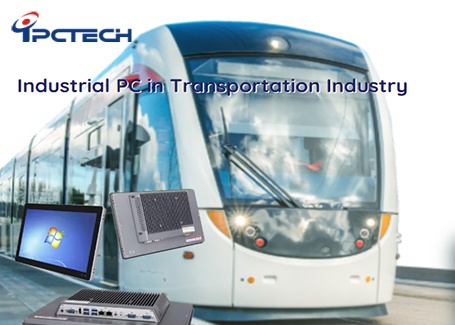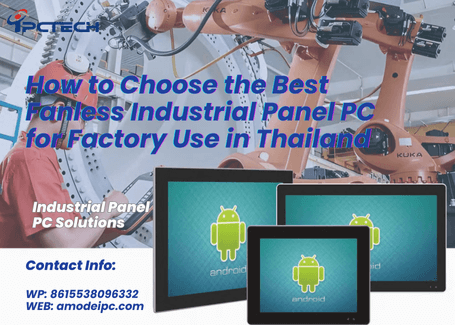How Are Industrial Panel PCs Constructed for Manufacturing Uses
2025-09-30
In manufacturing workshops, high temperatures, dust, and constant vibration are routine challenges for equipment operation—ordinary commercial computers often crash frequently in such environments, or even become completely unusable due to component damage. As the “nerve center” of production lines, industrial tablet PCs must not only handle core tasks like HMI interaction and real-time data acquisition but also withstand the erosion of harsh conditions. This capability stems not merely from “hardware reinforcement,” but from comprehensive customization spanning design philosophy to component selection.
With over two decades of experience developing fanless industrial equipment, we deeply understand manufacturing's stringent demands for equipment reliability. IPCTECH industrial tablet PCs are engineered around a core philosophy of “modular design + full-scenario adaptability,” integrating industrial-grade construction standards into every detail. This makes them the preferred choice for industries like automotive manufacturing and electronics processing.
Environmental Resilience: Withstanding the Triple Challenge of Dust, Vibration, and Temperature Fluctuations
Manufacturing workshop environments are far more complex than offices: automotive welding shops can reach temperatures above 50°C, electronic component production areas pose electrostatic risks, food processing facilities require frequent water washing, and the constant vibration in heavy machinery workshops presents the ultimate test for equipment components. Standard commercial computers' fan-based cooling systems quickly clog with dust; traditional hard drives suffer head crashes in vibration, causing data loss; even ordinary displays become unreadable under workshop glare.
Operational Stability: The Non-Negotiable Requirement for 24/7 Production
Manufacturing lines typically operate on two- or three-shift rotations, demanding equipment to run uninterrupted 24 hours a day, 365 days a year. This necessitates an industrial tablet's Mean Time Between Failures (MTBF) exceeding 50,000 hours—far surpassing the 15,000-hour standard for standard computers. Furthermore, production line components like PLCs, sensors, and robotic arms rely on real-time coordination via computers. Any computer lag or crash could halt the entire production line.
Manufacturing workshops often feature a mix of new and legacy equipment: smart sensors supporting Ethernet coexist with legacy robotic arms reliant on RS232/485 interfaces; monitoring stations requiring HDMI-expanded displays operate alongside material traceability systems that depend on USB-connected barcode scanners. Standard computers, with their limited and homogeneous interface options, struggle to meet these complex connectivity demands. Industrial tablet PCs must therefore offer comprehensive interface coverage with expandability.
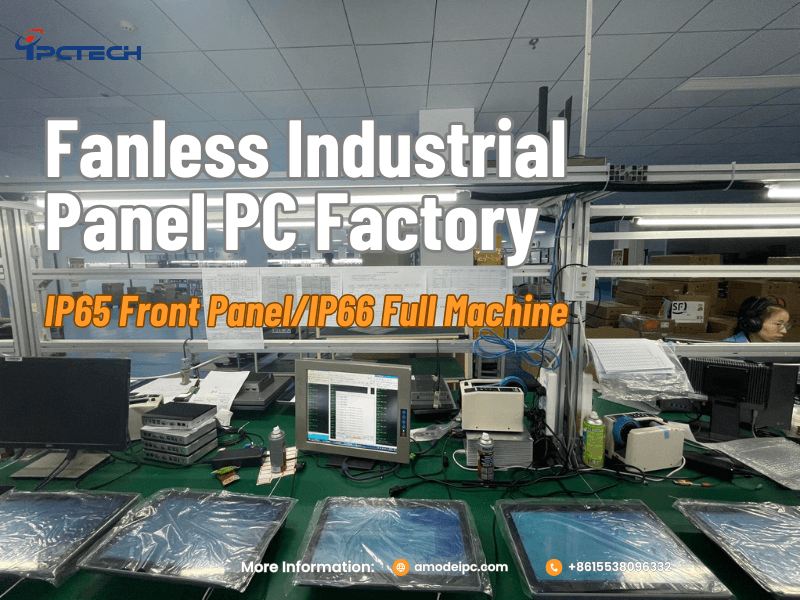
The enclosure serves as the first line of defense for industrial tablets and the core carrier of the thermal management system. The P8000 series abandons the conventional plastic casing + fan cooling approach found in standard computers, adopting an “integrated aluminum alloy enclosure + passive cooling” design. This not only enhances the protection rating but also eliminates issues like dust clogging and component wear caused by fans.
Material Selection: The Dual Advantages of Aluminum Alloy
The P8000 series housing utilizes aluminum alloy, precision-machined via CNC and anodized: Firstly, aluminum alloy's thermal conductivity exceeds plastic's by over 10 times, rapidly transferring heat generated by internal components to the housing surface. Secondly, the anodized layer achieves a hardness of HV300, withstanding minor workshop impacts and scratches to prevent housing deformation that could damage internal components. Compared to stainless steel enclosures, aluminum alloy also reduces equipment weight, facilitating installation on robotic arms or mobile workstations.
Protection Rating: IP65+ Dust and Water Resistance for Multi-Scene Adaptability
To meet diverse protection requirements across manufacturing environments, the P8000 series achieves IP65 protection through rigorous sealing design: EPDM rubber gaskets at enclosure seams and dust covers at interfaces effectively block dust ingress and splash water.
Thermal Design: Fanless + Heat Spreader for “Silent and Stable Temperature”
Fans are common wear-and-tear components in standard computers and also serve as pathways for dust ingress. The P8000 series employs a fanless passive cooling solution: a copper heat spreader is positioned beneath heat-generating core components like the CPU, evenly conducting heat to the aluminum alloy housing. Heat dissipation is then achieved through natural convection between the housing and surrounding air. The P8000 series operates stably within a temperature range of -20°C to 60°C. Even in high-temperature welding workshops during summer, the device's surface temperature remains only about 10°C above ambient conditions—well below component tolerance limits.
Displays for manufacturing environments must meet three key requirements: high-visibility in bright light, operability with gloves, and scratch resistance. The P8000 series offers both capacitive and resistive touch solutions, with display parameters optimized for shop floor conditions to ensure ease of operation and durability.
Touch Options: Choose Based on Need, Balancing Precision and Practicality
For scenarios requiring precise operations (e.g., MES system parameter settings), the P8000 series capacitive touchscreen supports 10-point touch with a response time ≤5ms and accuracy up to ±2mm, accurately recognizing finger touches even with slight oil residue. For scenarios requiring operation with thick gloves (e.g., automotive assembly shops), the resistive touchscreen enables pressure-sensitive operation, allowing users to perform taps, swipes, and other actions without removing gloves.
Display Parameters: High Brightness + Wide Viewing Angle for Workshop Glare
Standard computer displays typically operate at 250-300 nits brightness, often causing glare and visibility issues under workshop lighting. The P8000 series uniformly achieves 350 nits brightness, ensuring clear visibility even outdoors or in bright welding environments.
Size Coverage: 4:3 and 16:9 formats accommodate diverse workstations
Manufacturing workstations have diverse display size requirements: equipment monitoring stations need large screens for viewing multiple data sets, while operator stations near robotic arms require compact screens to save space. The P8000 series offers full size coverage: - 4:3 aspect ratio covers 7/8/10.4/12.1/15/17/19 inches, ideal for traditional HMI interfaces and data tables; The 16:9 aspect ratio covers 10.1/13.3/15.6/17.3/18.5/21.5/23.8/27/32 inches, ideal for video surveillance and multi-window operations.
The stability of the motherboard directly determines the operational reliability of the equipment. The P8000 series motherboard adopts industrial-grade design standards, with rigorous testing from chip selection to circuit layout to ensure long-term stable operation in high-temperature, vibration, and electromagnetic interference environments.
Processor: Low Power + High Performance, Balancing Heat Dissipation and Computing Power
To address diverse computational demands in manufacturing, the P8000 series offers multiple processor options: Entry-level models feature Intel Celeron N95/N100 processors with just 15W power consumption, ideal for basic HMI monitoring and data acquisition; Mid-to-high-end models utilize 4th-14th generation Intel Core i3/i5/i7 processors paired with B365/H670 chipsets, capable of handling compute-intensive tasks like AI vision inspection and complex data analysis. All processors feature industrial-grade packaging, operating reliably within a wide temperature range of -40°C to 85°C, eliminating throttling or system crashes common in consumer-grade processors under high temperatures.
Storage & Memory: Industrial-grade SSD + Wide-temperature memory, eliminating data loss
Conventional computer hard disk drives (HDDs) are prone to head-to-platter collisions in vibrating environments, while consumer-grade SSDs have limited temperature tolerance. The P8000 series comes standard with industrial-grade SSDs featuring SATA III interfaces, delivering read/write speeds exceeding 500MB/s. These SSDs support operation from -40°C to 85°C and withstand vibrations up to 1500G/0.5ms, ensuring data security even amid continuous vibrations in heavy machinery workshops. For memory, the P8000 series supports DDR4 2666/3200MHz industrial-grade RAM, expandable up to 32GB. This capacity meets the demands of multitasking operations, preventing system lag caused by insufficient memory.
Anti-interference Design: EMC + Surge Protection for Workshop Electromagnetic Environments
Variable frequency drives and welding equipment in manufacturing workshops generate intense electromagnetic radiation that can disrupt normal computer operation. The P8000 series motherboard employs multi-layered anti-interference design: it withstands 2000V surge impacts; signal lines are shielded to minimize electromagnetic interference on data transmission; and the entire motherboard has passed EMC certification, ensuring stable operation even in strong electromagnetic environments.
As mentioned earlier, manufacturing workshops demand complex equipment connectivity. The P8000 series employs a “full standard interfaces + modular expansion” design to ensure seamless integration with both new and legacy equipment while reserving space for future upgrades.
Standard Interfaces: Covering 90% of Manufacturing Connection Needs
The P8000 series' interface configuration is tailored for manufacturing scenarios:
- 2 RJ-45 Ethernet ports support Gigabit speeds, enabling simultaneous connection to MES systems and local LANs; 4-6 COM ports (some models support RS232/485/422 switching) meet connection needs for legacy PLCs and sensors; 4 USB 3.0 ports support peripherals like barcode scanners, printers, and mice.
Expansion Capabilities: Mini PCIe + Expansion Cards for Custom Needs
For specialized expansion needs, the P8000 series offers flexible solutions: All models feature 1-2 Mini PCIe slots, enabling 4G module expansion for wireless data transmission (ideal for mobile workstations without Ethernet coverage) and enhanced wireless connectivity speeds.
Interface Protection: Dust Covers + Rugged Design for Extended Lifespan
Workshop dust and frequent plugging/unplugging can cause interface damage or poor contact. The P8000 series employs reinforced interface design: USB and COM ports use anti-reverse connectors to prevent pin damage from incorrect insertion; all ports feature silicone dust covers that effectively block dust ingress when not in use; interfaces connect to the motherboard via soldered joints rather than standard plug-in designs, delivering over 3 times greater vibration resistance.
Power stability and system compatibility form the foundation for the long-term operation of industrial tablet PCs. The P8000 series comprehensively addresses the manufacturing industry's demands for “power supply fluctuations” and “software diversity” through its power design and system support.
Wide-Voltage Power Supply: 9-36V DC Input to Handle Grid Fluctuations
Manufacturing workshop power grids often experience voltage fluctuations (e.g., voltage dips during large equipment startup). Standard computer power adapters only support 100-240V AC input and are prone to shutdowns due to unstable voltage. The P8000 series employs industrial-grade wide-voltage power modules supporting 9-36V DC input. This enables compatibility with workshop DC power systems (e.g., 24V equipment power sources) while providing overvoltage, overcurrent, and short-circuit protection. Even if voltage spikes momentarily to 40V, the device automatically cuts power to prevent damage.
Multi-System Support: Windows + Linux for Diverse Software
Manufacturing software systems vary widely: HMI interfaces are often developed on Windows, while some embedded control software requires Linux support. The P8000 series fully supports Windows 7/10/11 and mainstream Linux distributions, offering pre-installation services to deploy systems and drivers per customer requirements, eliminating compatibility issues during self-installation.
Low-Power Design: Reduces 24/7 Operating Costs
Manufacturing equipment often operates around the clock, making power consumption a significant factor in long-term costs. The P8000 series minimizes power usage through dual hardware and software optimizations: low-power processors are selected, and the system supports hibernation and scheduled power cycling.
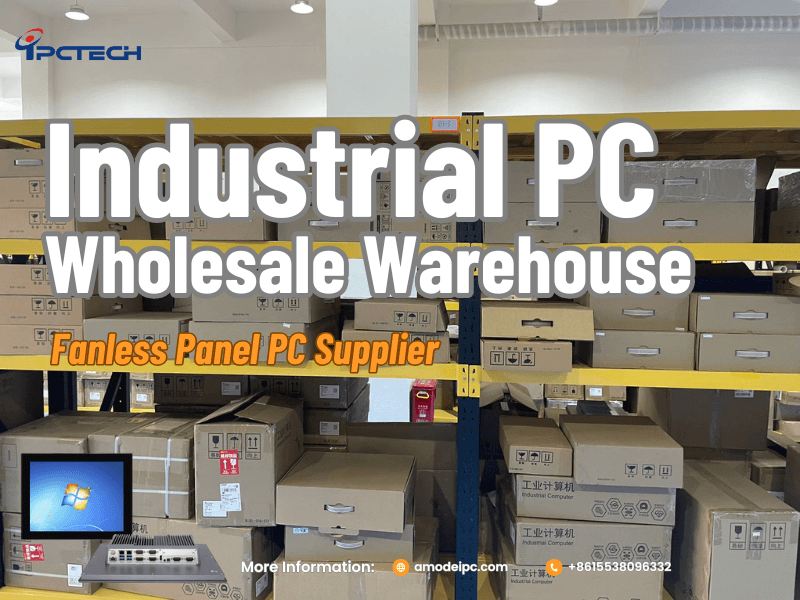
Different manufacturing segments have distinct requirements: automotive production demands high vibration resistance, food processing requires waterproofing and corrosion resistance, while electronics manufacturing necessitates electrostatic protection. The P8000 series not only offers universal models but also enables customized adjustments tailored to industry-specific needs, ensuring optimal performance across all scenarios.
The persistent vibration (20-2000Hz) and high temperatures (40-60°C) in automotive welding shops impose extreme demands on equipment stability. The P8000 series implements three critical optimizations for automotive manufacturing:
1. Vibration Protection: Motherboards and enclosures are connected via elastic buffer pads to minimize component impact from vibration; hard drives and memory are secured with snap-fit mechanisms to prevent loosening;
2. High-Temperature Adaptation: Heat sink area increased by 20% to ensure CPU temperature remains below 80°C in 60°C environments;
3. Interface Redundancy: Equipped with 6 COM ports to simultaneously connect welding robots, torque wrenches, barcode scanners, and other devices.
Electronic Components: Anti-static Design + High-Precision Touch for Precision Operations
1. Electrostatic Protection: Housing coated with an anti-static layer, surface resistance 10^6-10^9Ω, effectively dissipates static electricity;
2. Touch Precision: Utilizes high-precision capacitive touchscreen supporting 0.1mm-level touch accuracy, ideal for fine parameter adjustments;
3. Cleanroom Compatibility: The housing features a glare-free design to prevent reflections from obstructing operator visibility. Interface dust covers use food-grade silicone, enabling use in cleanroom environments.
Visual inspection and performance testing of new energy batteries require equipment with robust computing power and diverse interfaces (for connecting test devices). The P8000 series offers high-performance models for the new energy industry:
1. Enhanced Computing Power: Equipped with a 12th Gen Intel Core i7-1270P processor (14 cores, 20 threads), paired with 32GB DDR4 memory and a 1TB industrial-grade SSD, enabling simultaneous operation of 4 AI vision inspection algorithms;
2. Interface Expansion: Features 2 Mini PCIe slots, supporting simultaneous expansion of 4G modules and AI acceleration cards;
3. Screen Optimization: Features a 27-inch 1080P high-brightness display (800 nits brightness), supporting split-screen viewing of inspection images and data reports.
The environment is the fundamental prerequisite for selection, with three key indicators requiring focus:
- Protection Rating: For dusty environments requiring water washing (e.g., food, pharmaceuticals), select IP69K; for ordinary dust and minor splashes (e.g., machining), select IP65;
- Temperature Range: For high-temperature environments (e.g., welding, metallurgy), select models with a wide temperature range of -20°C to 70°C; for standard temperature environments (e.g., electronics assembly), choose models with a basic range of 0°C to 50°C.
- Vibration Rating: For high-vibration scenarios (e.g., automotive production lines, heavy machinery), select models with vibration test certification; for standard scenarios, basic vibration-resistant designs suffice.
Functional requirements determine the device's core performance. Evaluate these from three aspects:
- Computing Power Requirements:
Simple HMI monitoring: Celeron series processors;
Data acquisition and basic analysis: i3 series;
AI vision inspection and complex data analysis: i5/i7 series;
- Interface Requirements: Tally the types of devices needing connection (e.g., number of RS232 devices, number of Ethernet devices) to ensure sufficient interface quantity and types. Reserve Mini PCIe or expansion card slots for future scalability.
- Display Requirements:
- Small workstations (e.g., beside robotic arms): 7-10.1 inches. - Control room monitoring: 15-27 inches; High-brightness screens (500 nits+) for bright environments; Resistive touchscreens for glove operation.
Industrial tablets typically have a 5-7 year lifecycle. Long-term costs (maintenance, energy consumption, replacements) far exceed the purchase price. Key considerations during selection:
- Maintenance costs: Fanless designs require 30% less maintenance than fan-based models and should be prioritized;
- Energy costs: For 24/7 operation, choose low-power models to reduce energy consumption.
- Warranty service: Select manufacturers offering over 3 years of warranty with on-site repair to avoid post-purchase maintenance uncertainties.
Certain manufacturing scenarios demand specialized solutions (e.g., custom dimensions, proprietary interfaces, pre-installed software). Select manufacturers with robust customization capabilities.
The P8000 series offers customization across four dimensions:
1. Hardware Customization: Adjustable housing materials (aluminum alloy/stainless steel), screen brightness (350-1000 nits), and interface quantity;
2. Software Customization: Pre-installed systems and drivers, customized boot screens, pre-installed client-specific software;
3. Appearance Customization: Customizable housing colors, logo printing, mounting methods (wall-mounted/embedded/stand);
4. Small-Batch Support: Customization available even for orders as low as 10 units, with confidentiality agreements protecting client designs.
As a fanless industrial tablet PC manufacturer with over 20 years of experience, we firmly believe that outstanding industrial equipment must not only be functional but also user-friendly, durable, and adaptable. If your enterprise faces equipment selection challenges in manufacturing scenarios or requires customized industrial tablet solutions, we invite you to contact us. Our professional team will provide end-to-end services—from product recommendations to on-site commissioning—ensuring industrial equipment truly aligns with your production needs.
With over two decades of experience developing fanless industrial equipment, we deeply understand manufacturing's stringent demands for equipment reliability. IPCTECH industrial tablet PCs are engineered around a core philosophy of “modular design + full-scenario adaptability,” integrating industrial-grade construction standards into every detail. This makes them the preferred choice for industries like automotive manufacturing and electronics processing.
Why Can't Ordinary Commercial Computers Handle Manufacturing?
Environmental Resilience: Withstanding the Triple Challenge of Dust, Vibration, and Temperature Fluctuations
Manufacturing workshop environments are far more complex than offices: automotive welding shops can reach temperatures above 50°C, electronic component production areas pose electrostatic risks, food processing facilities require frequent water washing, and the constant vibration in heavy machinery workshops presents the ultimate test for equipment components. Standard commercial computers' fan-based cooling systems quickly clog with dust; traditional hard drives suffer head crashes in vibration, causing data loss; even ordinary displays become unreadable under workshop glare.
Operational Stability: The Non-Negotiable Requirement for 24/7 Production
Manufacturing lines typically operate on two- or three-shift rotations, demanding equipment to run uninterrupted 24 hours a day, 365 days a year. This necessitates an industrial tablet's Mean Time Between Failures (MTBF) exceeding 50,000 hours—far surpassing the 15,000-hour standard for standard computers. Furthermore, production line components like PLCs, sensors, and robotic arms rely on real-time coordination via computers. Any computer lag or crash could halt the entire production line.
Interface Compatibility: Bridging New and Legacy Equipment
Manufacturing workshops often feature a mix of new and legacy equipment: smart sensors supporting Ethernet coexist with legacy robotic arms reliant on RS232/485 interfaces; monitoring stations requiring HDMI-expanded displays operate alongside material traceability systems that depend on USB-connected barcode scanners. Standard computers, with their limited and homogeneous interface options, struggle to meet these complex connectivity demands. Industrial tablet PCs must therefore offer comprehensive interface coverage with expandability.
IPCTECH Industrial Panel PCs P8000 Series for Manufacturing

Enclosure and Heat Dissipation: Fanless Design + IP Protection for Harsh Environments
The enclosure serves as the first line of defense for industrial tablets and the core carrier of the thermal management system. The P8000 series abandons the conventional plastic casing + fan cooling approach found in standard computers, adopting an “integrated aluminum alloy enclosure + passive cooling” design. This not only enhances the protection rating but also eliminates issues like dust clogging and component wear caused by fans.
Material Selection: The Dual Advantages of Aluminum Alloy
The P8000 series housing utilizes aluminum alloy, precision-machined via CNC and anodized: Firstly, aluminum alloy's thermal conductivity exceeds plastic's by over 10 times, rapidly transferring heat generated by internal components to the housing surface. Secondly, the anodized layer achieves a hardness of HV300, withstanding minor workshop impacts and scratches to prevent housing deformation that could damage internal components. Compared to stainless steel enclosures, aluminum alloy also reduces equipment weight, facilitating installation on robotic arms or mobile workstations.
Protection Rating: IP65+ Dust and Water Resistance for Multi-Scene Adaptability
To meet diverse protection requirements across manufacturing environments, the P8000 series achieves IP65 protection through rigorous sealing design: EPDM rubber gaskets at enclosure seams and dust covers at interfaces effectively block dust ingress and splash water.
Thermal Design: Fanless + Heat Spreader for “Silent and Stable Temperature”
Fans are common wear-and-tear components in standard computers and also serve as pathways for dust ingress. The P8000 series employs a fanless passive cooling solution: a copper heat spreader is positioned beneath heat-generating core components like the CPU, evenly conducting heat to the aluminum alloy housing. Heat dissipation is then achieved through natural convection between the housing and surrounding air. The P8000 series operates stably within a temperature range of -20°C to 60°C. Even in high-temperature welding workshops during summer, the device's surface temperature remains only about 10°C above ambient conditions—well below component tolerance limits.
Display: Touch-sensitive precision + high brightness, optimized for workshop operation environments
Displays for manufacturing environments must meet three key requirements: high-visibility in bright light, operability with gloves, and scratch resistance. The P8000 series offers both capacitive and resistive touch solutions, with display parameters optimized for shop floor conditions to ensure ease of operation and durability.
Touch Options: Choose Based on Need, Balancing Precision and Practicality
For scenarios requiring precise operations (e.g., MES system parameter settings), the P8000 series capacitive touchscreen supports 10-point touch with a response time ≤5ms and accuracy up to ±2mm, accurately recognizing finger touches even with slight oil residue. For scenarios requiring operation with thick gloves (e.g., automotive assembly shops), the resistive touchscreen enables pressure-sensitive operation, allowing users to perform taps, swipes, and other actions without removing gloves.
Display Parameters: High Brightness + Wide Viewing Angle for Workshop Glare
Standard computer displays typically operate at 250-300 nits brightness, often causing glare and visibility issues under workshop lighting. The P8000 series uniformly achieves 350 nits brightness, ensuring clear visibility even outdoors or in bright welding environments.
Size Coverage: 4:3 and 16:9 formats accommodate diverse workstations
Manufacturing workstations have diverse display size requirements: equipment monitoring stations need large screens for viewing multiple data sets, while operator stations near robotic arms require compact screens to save space. The P8000 series offers full size coverage: - 4:3 aspect ratio covers 7/8/10.4/12.1/15/17/19 inches, ideal for traditional HMI interfaces and data tables; The 16:9 aspect ratio covers 10.1/13.3/15.6/17.3/18.5/21.5/23.8/27/32 inches, ideal for video surveillance and multi-window operations.
Motherboard and Core Components: Industrial-grade selection ensures 24/7 stable operation
The stability of the motherboard directly determines the operational reliability of the equipment. The P8000 series motherboard adopts industrial-grade design standards, with rigorous testing from chip selection to circuit layout to ensure long-term stable operation in high-temperature, vibration, and electromagnetic interference environments.
Processor: Low Power + High Performance, Balancing Heat Dissipation and Computing Power
To address diverse computational demands in manufacturing, the P8000 series offers multiple processor options: Entry-level models feature Intel Celeron N95/N100 processors with just 15W power consumption, ideal for basic HMI monitoring and data acquisition; Mid-to-high-end models utilize 4th-14th generation Intel Core i3/i5/i7 processors paired with B365/H670 chipsets, capable of handling compute-intensive tasks like AI vision inspection and complex data analysis. All processors feature industrial-grade packaging, operating reliably within a wide temperature range of -40°C to 85°C, eliminating throttling or system crashes common in consumer-grade processors under high temperatures.
Storage & Memory: Industrial-grade SSD + Wide-temperature memory, eliminating data loss
Conventional computer hard disk drives (HDDs) are prone to head-to-platter collisions in vibrating environments, while consumer-grade SSDs have limited temperature tolerance. The P8000 series comes standard with industrial-grade SSDs featuring SATA III interfaces, delivering read/write speeds exceeding 500MB/s. These SSDs support operation from -40°C to 85°C and withstand vibrations up to 1500G/0.5ms, ensuring data security even amid continuous vibrations in heavy machinery workshops. For memory, the P8000 series supports DDR4 2666/3200MHz industrial-grade RAM, expandable up to 32GB. This capacity meets the demands of multitasking operations, preventing system lag caused by insufficient memory.
Anti-interference Design: EMC + Surge Protection for Workshop Electromagnetic Environments
Variable frequency drives and welding equipment in manufacturing workshops generate intense electromagnetic radiation that can disrupt normal computer operation. The P8000 series motherboard employs multi-layered anti-interference design: it withstands 2000V surge impacts; signal lines are shielded to minimize electromagnetic interference on data transmission; and the entire motherboard has passed EMC certification, ensuring stable operation even in strong electromagnetic environments.
Interfaces and Expansion: Full Interface Coverage + Modular Design for Complex Connectivity
As mentioned earlier, manufacturing workshops demand complex equipment connectivity. The P8000 series employs a “full standard interfaces + modular expansion” design to ensure seamless integration with both new and legacy equipment while reserving space for future upgrades.
Standard Interfaces: Covering 90% of Manufacturing Connection Needs
The P8000 series' interface configuration is tailored for manufacturing scenarios:
- 2 RJ-45 Ethernet ports support Gigabit speeds, enabling simultaneous connection to MES systems and local LANs; 4-6 COM ports (some models support RS232/485/422 switching) meet connection needs for legacy PLCs and sensors; 4 USB 3.0 ports support peripherals like barcode scanners, printers, and mice.
Expansion Capabilities: Mini PCIe + Expansion Cards for Custom Needs
For specialized expansion needs, the P8000 series offers flexible solutions: All models feature 1-2 Mini PCIe slots, enabling 4G module expansion for wireless data transmission (ideal for mobile workstations without Ethernet coverage) and enhanced wireless connectivity speeds.
Interface Protection: Dust Covers + Rugged Design for Extended Lifespan
Workshop dust and frequent plugging/unplugging can cause interface damage or poor contact. The P8000 series employs reinforced interface design: USB and COM ports use anti-reverse connectors to prevent pin damage from incorrect insertion; all ports feature silicone dust covers that effectively block dust ingress when not in use; interfaces connect to the motherboard via soldered joints rather than standard plug-in designs, delivering over 3 times greater vibration resistance.
Power Supply and System: Wide-Voltage Input + Multi-System Support, Adapting to Workshop Power Supply and Software Requirements
Power stability and system compatibility form the foundation for the long-term operation of industrial tablet PCs. The P8000 series comprehensively addresses the manufacturing industry's demands for “power supply fluctuations” and “software diversity” through its power design and system support.
Wide-Voltage Power Supply: 9-36V DC Input to Handle Grid Fluctuations
Manufacturing workshop power grids often experience voltage fluctuations (e.g., voltage dips during large equipment startup). Standard computer power adapters only support 100-240V AC input and are prone to shutdowns due to unstable voltage. The P8000 series employs industrial-grade wide-voltage power modules supporting 9-36V DC input. This enables compatibility with workshop DC power systems (e.g., 24V equipment power sources) while providing overvoltage, overcurrent, and short-circuit protection. Even if voltage spikes momentarily to 40V, the device automatically cuts power to prevent damage.
Multi-System Support: Windows + Linux for Diverse Software
Manufacturing software systems vary widely: HMI interfaces are often developed on Windows, while some embedded control software requires Linux support. The P8000 series fully supports Windows 7/10/11 and mainstream Linux distributions, offering pre-installation services to deploy systems and drivers per customer requirements, eliminating compatibility issues during self-installation.
Low-Power Design: Reduces 24/7 Operating Costs
Manufacturing equipment often operates around the clock, making power consumption a significant factor in long-term costs. The P8000 series minimizes power usage through dual hardware and software optimizations: low-power processors are selected, and the system supports hibernation and scheduled power cycling.
P8000 Series Panel PCs Application-IPCTECH Solutions

Different manufacturing segments have distinct requirements: automotive production demands high vibration resistance, food processing requires waterproofing and corrosion resistance, while electronics manufacturing necessitates electrostatic protection. The P8000 series not only offers universal models but also enables customized adjustments tailored to industry-specific needs, ensuring optimal performance across all scenarios.
Automotive Manufacturing: Vibration Resistance + Wide Temperature Design for Production Line Environments
The persistent vibration (20-2000Hz) and high temperatures (40-60°C) in automotive welding shops impose extreme demands on equipment stability. The P8000 series implements three critical optimizations for automotive manufacturing:
1. Vibration Protection: Motherboards and enclosures are connected via elastic buffer pads to minimize component impact from vibration; hard drives and memory are secured with snap-fit mechanisms to prevent loosening;
2. High-Temperature Adaptation: Heat sink area increased by 20% to ensure CPU temperature remains below 80°C in 60°C environments;
3. Interface Redundancy: Equipped with 6 COM ports to simultaneously connect welding robots, torque wrenches, barcode scanners, and other devices.
Electronic Components: Anti-static Design + High-Precision Touch for Precision Operations
The P8000 series incorporates anti-static design for electronics manufacturing:
1. Electrostatic Protection: Housing coated with an anti-static layer, surface resistance 10^6-10^9Ω, effectively dissipates static electricity;
2. Touch Precision: Utilizes high-precision capacitive touchscreen supporting 0.1mm-level touch accuracy, ideal for fine parameter adjustments;
3. Cleanroom Compatibility: The housing features a glare-free design to prevent reflections from obstructing operator visibility. Interface dust covers use food-grade silicone, enabling use in cleanroom environments.
New Energy Batteries: High Computing Power + Multiple Interfaces
Visual inspection and performance testing of new energy batteries require equipment with robust computing power and diverse interfaces (for connecting test devices). The P8000 series offers high-performance models for the new energy industry:
1. Enhanced Computing Power: Equipped with a 12th Gen Intel Core i7-1270P processor (14 cores, 20 threads), paired with 32GB DDR4 memory and a 1TB industrial-grade SSD, enabling simultaneous operation of 4 AI vision inspection algorithms;
2. Interface Expansion: Features 2 Mini PCIe slots, supporting simultaneous expansion of 4G modules and AI acceleration cards;
3. Screen Optimization: Features a 27-inch 1080P high-brightness display (800 nits brightness), supporting split-screen viewing of inspection images and data reports.
How to Choose the Right Industrial Tablet PC? A Selection Guide for Manufacturing
Step 1: Assess Environmental Characteristics and Determine Protection and Tolerance Standards
The environment is the fundamental prerequisite for selection, with three key indicators requiring focus:
- Protection Rating: For dusty environments requiring water washing (e.g., food, pharmaceuticals), select IP69K; for ordinary dust and minor splashes (e.g., machining), select IP65;
- Temperature Range: For high-temperature environments (e.g., welding, metallurgy), select models with a wide temperature range of -20°C to 70°C; for standard temperature environments (e.g., electronics assembly), choose models with a basic range of 0°C to 50°C.
- Vibration Rating: For high-vibration scenarios (e.g., automotive production lines, heavy machinery), select models with vibration test certification; for standard scenarios, basic vibration-resistant designs suffice.
Step 2: Define Functional Requirements and Match Hardware/Interface Configuration
Functional requirements determine the device's core performance. Evaluate these from three aspects:
- Computing Power Requirements:
Simple HMI monitoring: Celeron series processors;
Data acquisition and basic analysis: i3 series;
AI vision inspection and complex data analysis: i5/i7 series;
- Interface Requirements: Tally the types of devices needing connection (e.g., number of RS232 devices, number of Ethernet devices) to ensure sufficient interface quantity and types. Reserve Mini PCIe or expansion card slots for future scalability.
- Display Requirements:
- Small workstations (e.g., beside robotic arms): 7-10.1 inches. - Control room monitoring: 15-27 inches; High-brightness screens (500 nits+) for bright environments; Resistive touchscreens for glove operation.
Step 3: Focus on long-term operating costs, not just purchase price
Industrial tablets typically have a 5-7 year lifecycle. Long-term costs (maintenance, energy consumption, replacements) far exceed the purchase price. Key considerations during selection:
- Maintenance costs: Fanless designs require 30% less maintenance than fan-based models and should be prioritized;
- Energy costs: For 24/7 operation, choose low-power models to reduce energy consumption.
- Warranty service: Select manufacturers offering over 3 years of warranty with on-site repair to avoid post-purchase maintenance uncertainties.
Step 4: Verify Customization Capabilities for Special Requirements
Certain manufacturing scenarios demand specialized solutions (e.g., custom dimensions, proprietary interfaces, pre-installed software). Select manufacturers with robust customization capabilities.
The P8000 series offers customization across four dimensions:
1. Hardware Customization: Adjustable housing materials (aluminum alloy/stainless steel), screen brightness (350-1000 nits), and interface quantity;
2. Software Customization: Pre-installed systems and drivers, customized boot screens, pre-installed client-specific software;
3. Appearance Customization: Customizable housing colors, logo printing, mounting methods (wall-mounted/embedded/stand);
4. Small-Batch Support: Customization available even for orders as low as 10 units, with confidentiality agreements protecting client designs.
How Do Industrial Panel PCs Empower Intelligent Upgrades in Manufacturing?
As a fanless industrial tablet PC manufacturer with over 20 years of experience, we firmly believe that outstanding industrial equipment must not only be functional but also user-friendly, durable, and adaptable. If your enterprise faces equipment selection challenges in manufacturing scenarios or requires customized industrial tablet solutions, we invite you to contact us. Our professional team will provide end-to-end services—from product recommendations to on-site commissioning—ensuring industrial equipment truly aligns with your production needs.
Recommended



